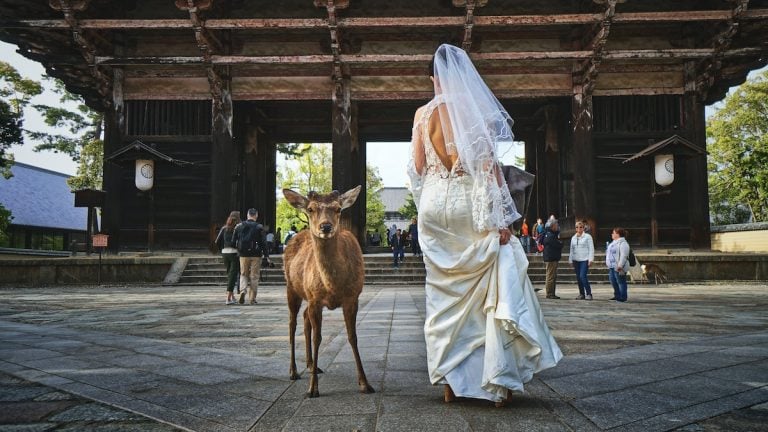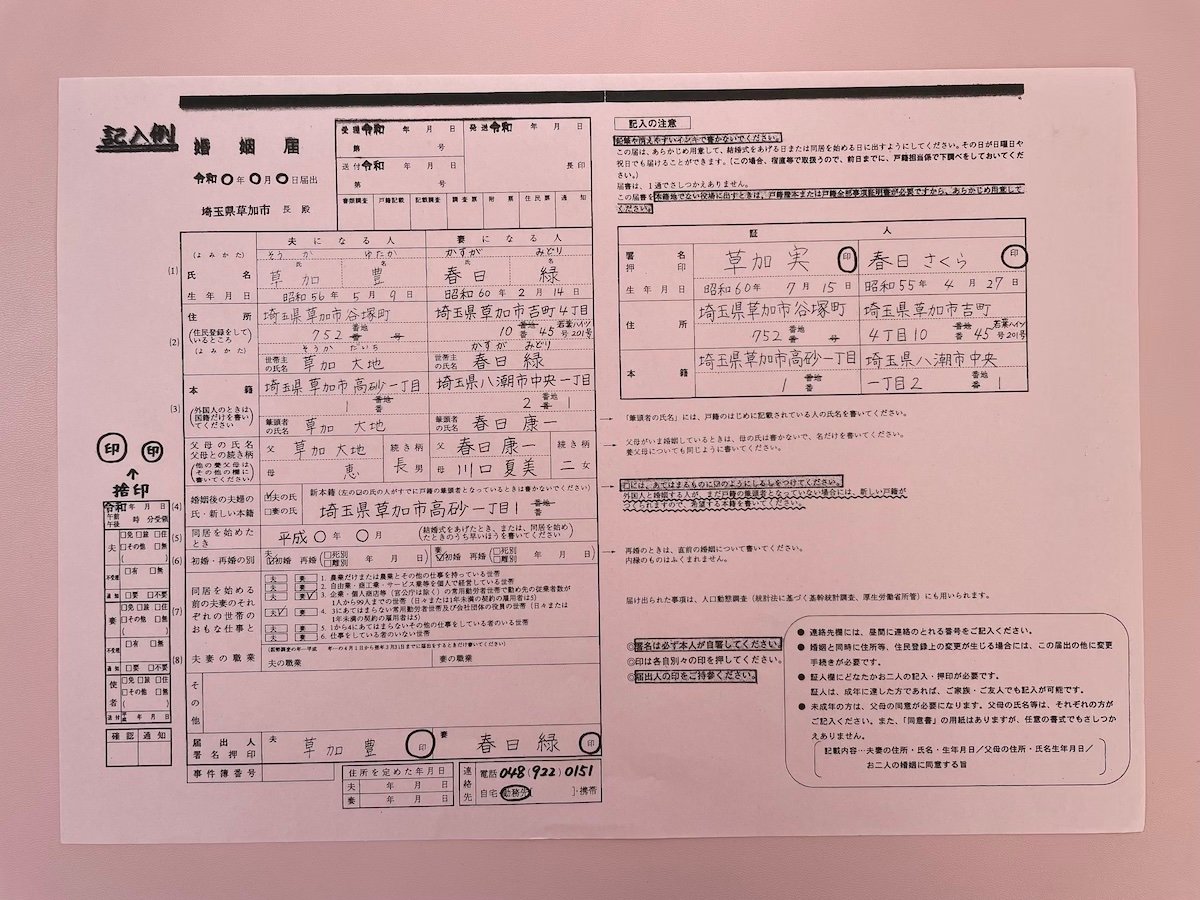
When getting married in Japan, there are two options for you to take: the legal and straightforward method of registering the union at a local government office or taking it a step further and having the wedding of your dreams. Either way, here are a few things to remember before tying the knot.
Legal requirements to getting married in Japan
Much like other countries, there are legalities to getting married in Japan. These are written in articles 731 to 737 of the Japanese Civil Code, highlighting that the male partner must be at least 18 years old and the female partner at least 16 years old. Furthermore, a person under the age of 20 can’t get married in the country without the approval or consent of one of the parents.
Lastly, a woman cannot get married within six months of the dissolution of her previous marriage or divorce. This is practiced to avoid confusion as to the identification of a child’s father if a pregnancy occurs close in time to the end of the previous marriage.


Documents needed to register a marriage
Getting married in Japan is a pretty simple process. You need an application for registration of marriage (konin todoke) signed by two witnesses (of any nationality) who are over 20 years old, both partners’ birth certificates (if it’s in another language, a Japanese translation is needed), passports, and an affidavit of competency to marry (countries have different versions of this but it basically confirms that you are of legal age and unmarried). That’s it!
If you want to be on the safe side or both partners are neither Japanese, it is recommended to double-check with the local municipal office you are planning to legally register the marriage at and ask for any other documents needed. For example, you might need to authenticate the documents with an apostille which adds another step and cost to the process before registering.
Consider the process and fees
Once you have the needed documents, you can register at the nearest city hall of the Japanese partner’s legal residence or the closest local government office for non-citizens. Did you know that you can also register the marriage through the mail if one of the parties is Japanese? The process of registering the marriage legally really lacks all the bells and whistles. After a few weeks, you can then request a Certificate of Acceptance Notification of Marriage to confirm your marriage.
Regarding the fees for registering your marriage, the Affidavit to Marry for foreigners is usually around ¥5,500, while getting the proof or Certificate of Acceptance Notification of Marriage costs from ¥350 to ¥1,400. Don’t forget the price for translations, if any, which typically starts from ¥5,000.

Types of wedding ceremonies in Japan
There are two main types of weddings in Japan: the civil or religious ceremony. You can have only a civil wedding or a combination of both, but for the marriage to be considered legal in Japanese law, it must go through the civil process of registration at the city or municipal office. If you’re after the legality of the marriage, then you can get tie the knot on the same day through a civil wedding.
However, if you want that Buddhist wedding of your dreams, then, by all means, have it in the country deeply rooted in traditions. The ceremony is called kekkon shiki hiroen and is usually held at a shrine or temple. Of course, you can still have it at a chapel, hotel, or garden, depending on preference. The reception followed by the after-party (nijikai) are other common practices included in the wedding ceremony.
We’ve all heard of lavish weddings with eye-popping budgets – an event that is a dream come true for the bride (or groom). Although you’re getting married in one of the most expensive countries in the world, you don’t have to break the bank to do so. On average, a wedding ceremony in Japan costs about ¥3 million, including around 70 guests, the dress or kimono, venue, catering, etc. There are ways to lower the bill further, such as renting the dress or kimono or going for wedding packages.
Here are a few of the most popular wedding venues in Japan: The Heian Shrine in Kyoto, Ritz Carlton Hotel in Osaka, La Boulette in Tokyo, Fujiya Hotel in Hakone, the Coralvita Chapel in Okinawa, and Disney Hotel in Tokyo.
Regarding same-sex marriages, Japan’s constitution is still behind in this manner wherein the constitution doesn’t recognize this type of institution. Still, there are cities across Japan that offer same-sex partnerships or wedding ceremonies that cater to the couple.

The Marriage of Convenience Issue
When my then-fiancé and I got married in Japan and began processing the next step to settling here, it was a rather lengthy process. The Japanese government is very critical about citizens marrying foreigners, given the increasing cases of marriage of convenience. This term refers to foreigners who want to marry a Japanese for the sole purpose of obtaining a Spouse or Child of a Japanese National visa which is quite powerful, offering them no limitations to working and living in the country.
If you plan on pursuing a spouse visa after marriage, it is crucial to document your relationship. From photos of you and your partner dating to screenshots of conversations, any proof can be used to your advantage. When I submitted our papers for my husband’s Certificate of Eligibility (the main bottleneck to any visa in Japan), it was like passing a thesis all over. Needless to say, that extra due diligence helped, and we got the approval quicker than usual.

Divorce in Japan
My Japanese cousin, who was married to a Japanese, served as one of our witnesses when we registered our marriage at the city hall. It was during this time that she also informed us of how easy it was to get divorced. Although we have no plans to do so, it was surprising to find out that my husband and I don’t even need to be present to get divorced. All I had to do was go to the city hall, sign a paper, and that’s it. Apparently, it is a breeze to legally register and end a marriage here.
Upon further research, it turns out that she was right. There are four main types of divorce in Japan, by mutual agreement (kyogi rikon), by mediation in a family court (chotei rikon), by decision of a family court (shimpan rikon), and by judgment of a district court (saiban rikon). The first is the simplest and can be achieved quickly if both parties agree. If a mutual agreement cannot be reached, the filing of divorce goes through the following three stages.
The divorce rate in Japan is not as high as in other countries like the United States, although it is steadily growing. It was considered taboo or frowned upon in older generations but is losing its stigma nowadays. For example, the divorce rate in Japan jumped 66 percent between 1980 and 2012, meaning about 1.8 divorces per 1,000 people.
Getting married in Japan might seem confusing or complicated at first, but there are many guides readily available online as well as companies that offer services, from the paperwork to wedding planning. Maximize these avenues and make your special day as stress-free as possible.













